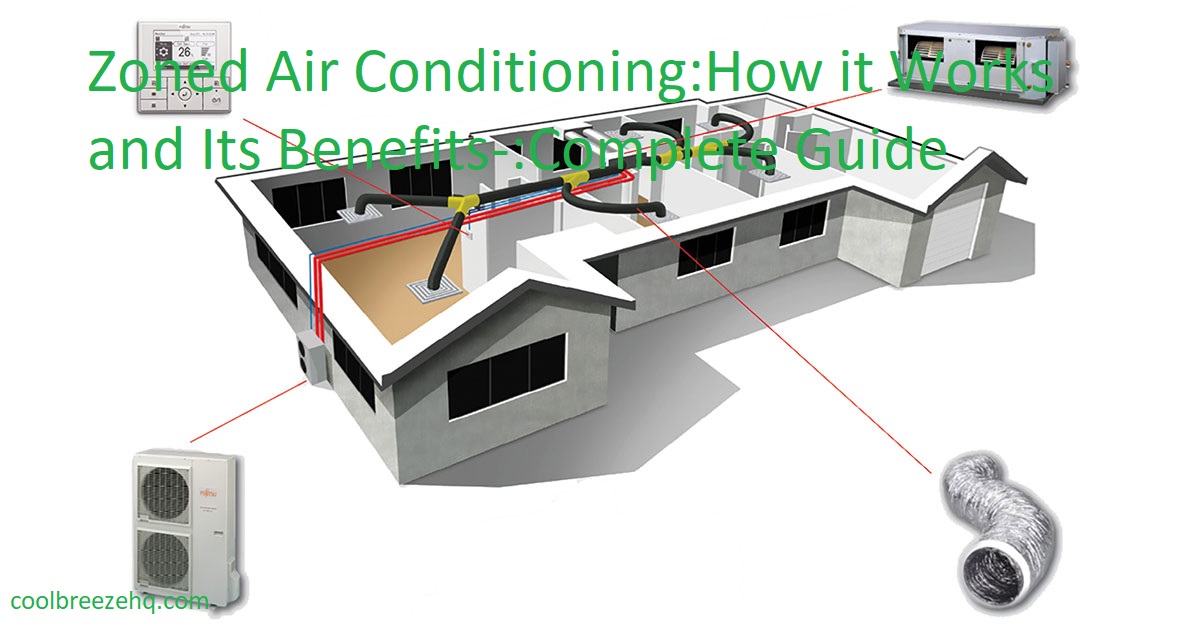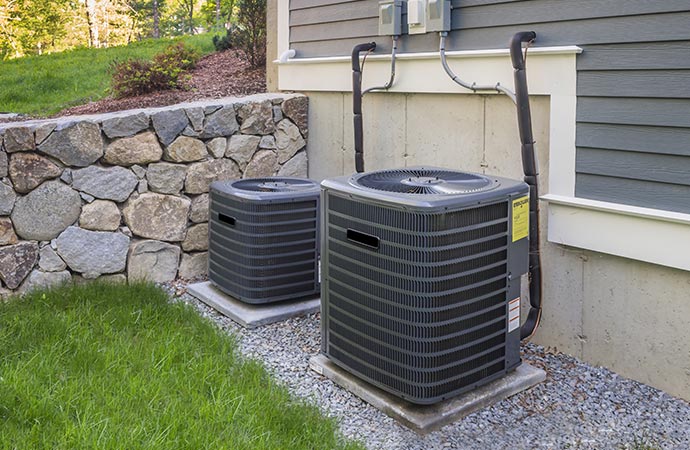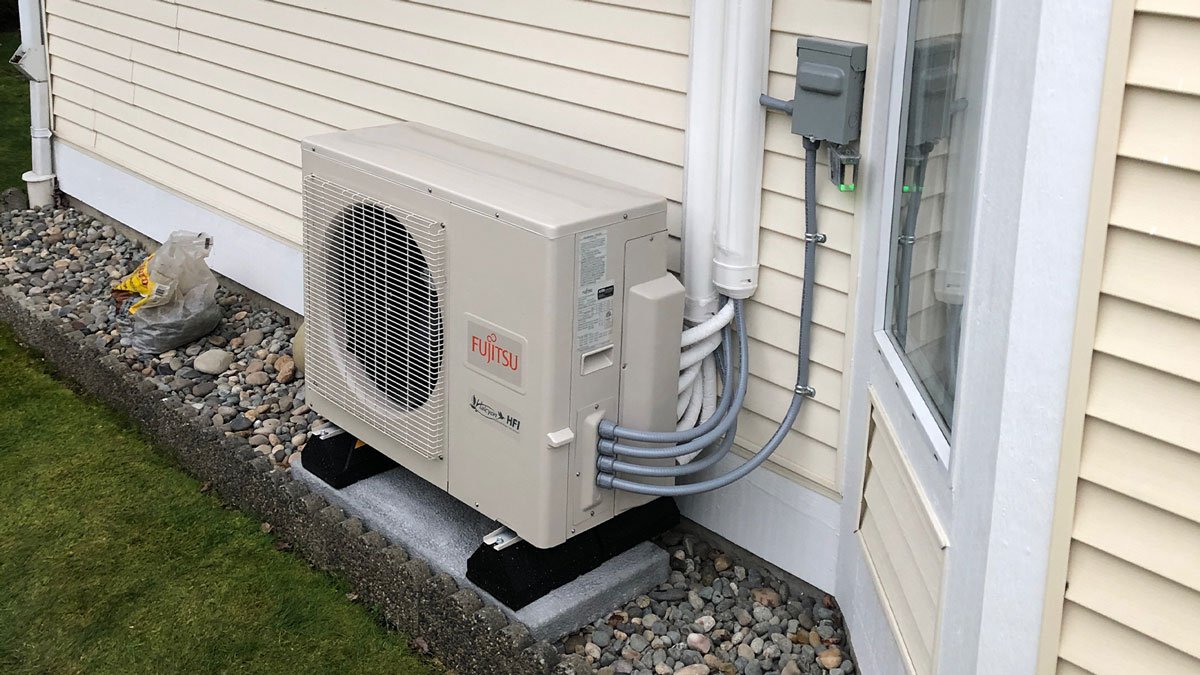Do you feel uncomfortable in your home due to hot and cold spots?
Zoned air conditioning can provide a solution. With its ability to cool or heat one area at a time, it offers more control over your home’s temperature. Learn how zoned air conditioning works and the benefits it offers!
Zoned air conditioning is an energy-efficient cooling solution that can cool different parts of a home or building independently. It allows homeowners to personalize the temperature in individual rooms, which helps reduce their utility bills and increase the comfort of their family members and guests. By controlling temperatures in a specific area, zoned air conditioning systems allow homeowners to create the ideal indoor environment while still saving energy.
By providing independent temperature settings for each zone, zoned air conditioning systems ensure optimal comfort levels throughout the home and offer several other benefits as well. This guide will discuss how this type of system works, its numerous advantages, potential installation options, and how it can help homeowners save money on their energy bills.
Benefits of zoned air conditioning
Zoned air conditioning systems provide personalized cooling for desired areas of the home to achieve maximum comfort and energy savings. Benefits of system include:
- Reduced Energy Consumption: With the ability to customize indoor temperature settings, you can set rooms that require more or less cooling than other areas, allowing you to save money on your utility bills.
- Improved Comfort: Zoned air conditioning systems allow individual temperatures for different rooms as desired, creating zones of personalized comfort. With these systems, temperatures can be adjusted for select rooms based on needs and preferences throughout the day.
- Enhanced Indoor Air Quality: With zoned air conditioning systems, the air filters can be filled with quality materials to help reduce impurities in the air such as mold spores and dust particles that lower indoor air quality in your home. This helps make your living environment healthier and more comfortable by increasing ventilation effectiveness at specified zones throughout your home.
- Reduced Noise Levels: The noise levels from typical AC units may impact one’s ability to sleep or rest peacefully in certain areas of their home; however, with Zoned Air Conditioning Systems you minimize unwanted sounds from blowers and compressors allowing each area within your living environment to remain comfortable without intrusive noise levels while offering quiet operation when performing its job of keeping you cool!
Improved energy efficiency
Zoned air conditioning uses a zoning system to control the temperature of different parts of your home. It allows you to customize the temperature in different rooms, as well as use fewer resources by targeting specific areas that require cooling. This can lead to a considerable decrease in energy usage and costs when compared with traditional air conditioning systems.
Zoned air conditioning systems employ several components which work together to create a system of zones within the home – each zone is managed independently from the others by individual thermostats. These systems can also include humidifiers, dehumidifiers and ventilation fans for added comfort control throughout the year.
A zoned AC system provides an efficient method of cooling and heating various parts of your home without wasting energy on areas that need less cooling or heat. The individual thermostats communicate with motors located in your ducts which open and close dampers to direct airflow where it’s needed most. This ensures that no unnecessary energy is wasted on regions within your household which don’t require any cooling or heating at a certain time, thus resulting in greater efficiency overall.
Increased comfort and control
Zoned air conditioning systems enable homemakers to adjust temperatures in different areas of the house to meet their comfort needs. With a traditional HVAC system, a single setting is used for the entire home and while this offers an overall comfortable temperature, it can still leave some areas of the house too warm or too cool.
A zoned system, however, allows you to adjust settings in each zone – rooms or group of rooms – based on individual needs and preferences. As a result, people in every room can be more comfortable as they can truly control the climate around them. This level of control also means that there is no need to overcool one room when another is adequately cooled and vice versa, resulting in more efficient energy use.
Reduced wear and tear on the HVAC system
One of the major benefits of zoned HVAC systems is the reduction in wear and tear on the system. When an HVAC system is operating constantly at a single speed, it can cause unnecessary strain on the compressor, blower motor, air filter and other components. This can result in more routine maintenance needs and shorter system lifespan.
By strategically isolating and regulating temperatures with individual thermostats, the system runs more efficiently and requires less maintenance to keep it functioning properly. In addition, since rooms that are rarely used are not heated or cooled as often, there are also energy savings to be realized from reduced usage and increased efficiency.

Cost savings
Zoned air conditioning can bring homeowners notable cost savings compared to traditional AC systems that cool the entire house. By allowing control over which parts of the home are cooled at any given time, zoned air conditioning systems help reduce energy consumption, since homeowners don’t need to constantly run their HVAC system.
The specific savings depend on the type of system installed, but the Department of Energy (DOE) estimates that zoned air conditioning systems typically save homeowners between 15 and 20 percent on their cooling costs by allowing them to adjust how much air is being cooled at any given time. The DOE also notes that up to 40 percent in energy costs can be saved if a high-efficiency system is used and if a variable speed fan is included.
By installing both Zoning Controls and zoning dampers in conjunction with your existing HVAC system, you can create separate temperature zones for different rooms in your home based on individual preferences. This means your family members will be more comfortable at all times while saving money over running an entire home HVAC system throughout the day.
Factors to consider before installing a zoned air conditioning system
Before you make the decision to install a zoned air conditioning system, it’s important to understand the potential benefits and the potential costs associated with this type of system.
First, consider the number of zones you’d like to have in your home. Do you want to only have two or three zones? Or would you like a few more that limit certain areas of your home?
Secondly, consider where the thermostats will be placed for optimum performance and energy savings. You’ll also need to decide if you want additional features such as air quality sensors or temperature monitoring devices so that temperatures can be monitored remotely.
Additionally, if your zoning system includes more than one control panel, they should be carefully located within the building so that each zone operates at its optimal temperature.
Finally, consider if there are any special requirements for installation that may increase costs associated with purchasing and installing a zoned system.
Taking these items into consideration will ensure that you get the most out of your zoned air conditioning system.
Size and layout of the home
Accurately sizing and properly layout of the home is one of the most important aspects to consider when setting up an effective zoned air conditioning system.
In order to create multiple zones within the home, it is important to identify boundaries for each zone. This could be done by assigning rooms and hallways that can be divided into separate areas with distinct central air zones as necessary. Generally speaking, larger homes work best with zoning but even many small homes will benefit from the zoning technology available in modern air conditioners.
Once zoning areas are identified and clearly defined, new zoned systems must be fitted according to this layout. If there would not exist any boundaries that divide the different areas, then a zoned system may not be able to effectively draw a separation between them and this could lead to less efficient cooling or higher energy costs.
The layout should include measurements of all walls as well as windows and doors where air transfer will occur in order for the installer to determine which components are needed for each zone and how large of a unit must be installed for effective performance in each area.
Types of HVAC systems compatible with zoning
There are many types of heating and cooling systems that can be zoned, allowing homeowners to customize the temperature in different parts of their home. Having different zones also helps to conserve energy in certain areas when they are not being utilized. Below is a list of commonly used HVAC systems compatible with zoning:
- Split System: A split system is made up of an outdoor unit containing the compressor and a connected indoor unit, often referred to as an evaporator coil. It is typically used for residential homes and can be used for both cooling and heating.
- Ductless Split System: This type of system allows you to control the temperature in multiple rooms or zones from one outdoor unit instead of having multiple air handlers or compressors inside your house. The outdoor unit still provides the same performance as a split system but enables more individualized comfort control over each zone with built-in thermostats or sensors.
- Packaged Terminal Air Conditioners (PTAC): PTAC units contain all their components, such as the condenser, compressor and evaporator coil, within one housing unit located outside your building’s window or wall sleeve, making them ideal for hotels where rooms need separate controlling points for heating and cooling needs in each room space.
4 Hybrid Systems: Hybrid systems combine two types of HVAC systems by running both a gas or electric boiler with an air conditioner to provide superior comfort along with greater efficiency than two separate HVAC systems running independently from each other These hybrid HVAC systems provide better humidity control over conventional temperature-based controls especially in warm climates.
With these different types of HVAC units available for zoning purposes, you can enjoy comfortable temperatures year round wherever you are in your home by controlling it through individual thermostats and sensors placed throughout different rooms or zones within your house – so no matter what type of climate you’re living in– humidity , coolness, warmth — zoning offers endless possibilities!
Cost considerations
When considering installing zoned air conditioning a homeowner should consider the additional cost of installing the extra equipment, such as a zone control panel, dampers and thermostats. They will also need to factor in any additional labour costs if they require electrician or HVAC services to install the system. Installing zoned air conditioning can incur higher energy costs as each zone is independently controlled rather then having one uniform temperature throughout the house. It is essential that homeowners are aware of these considerations before making a decision whether or not to install zoned air conditioning in their home.
While there may be extra upfront costs for installation materials and services, many homeowners find that these costs are counterbalanced over time by improved efficiency which leads to lower energy bills year-round. As mentioned before, when each room is controlled separately any unused rooms needn’t require heating or cooling resulting in overall lower energy consumption and cost savings. Additionally, zoning systems give homeowners improved control over humidity levels in various parts of their homes ensuring comfortable conditions all year round.
Furthermore, zone technology allows for differential temperatures in different parts of one home allowing couples routine conflict resolution without having to compromise on comfort settings. The ability to programme special events like dinner parties or overnight guests helps optimise efficiency and puts more money back into homeowners pockets.
Maintenance requirements
When it comes to air conditioning systems, regular maintenance is key. As with all appliances, zoned air conditioning systems require periodic checks to ensure the unit is in good working order. Maintenance requirements will vary depending on the setup, but the most common tasks necessary for optimal operation include inspecting and replacing filters; cleaning evaporator coils and condensate drains; lubricating motors and other moving parts; and conducting system performance tests.
Additionally, it is important to check outdoor units for signs of damage from rain or ice storms as these can affect a system’s efficiency. Regular maintenance can help prolong the life of your zoned air conditioning system while helping to keep it running efficiently and safely.
Conclusion
As you can see, zoned air conditioning is a great way to save energy while not having to sacrifice your comfort. You can have the consistency of temperature and humidity in different zones that perfectly fit your needs. With its ease of installation, compatibility with most HVAC systems, as well as it’s cost-effectiveness, it is a great option for anyone that is looking for an efficient cooling solution.
When purchasing a zoned AC system, be sure to do your research and find one that fits the size of your home. A professional HVAC contractor should be able to help you select the right system for you and answer any questions about installation or maintenance. With proper upkeep, it will keep your home comfortable for many years to come.
FAQ
What is the advantage of zoned air conditioning system?
The advantage of zoned air conditioning system is that it allows for the control of temperatures in different areas or zones of a building, which can result in energy savings and increased comfort.
How does zoned air conditioning work?
Zoned air conditioning works by dividing a building into separate zones and installing dampers in the ductwork that can be controlled independently, allowing for different temperatures to be set in each zone.
What is one advantage of a multizone HVAC system?
One advantage of a multizone HVAC system is that it allows for the customization of heating and cooling for different areas of a building, which can result in energy savings and increased comfort.
What are two advantages of zoning?
Two advantages of zoning are increased energy efficiency and the ability to customize heating and cooling for different areas of a building.
Is air conditioning zoning worth it?
Air conditioning zoning can be worth it for those looking to increase energy efficiency and customize heating and cooling for different areas of a building, but it depends on individual circumstances and needs.
What is the most efficient form of air conditioning?
The most efficient form of air conditioning is one that is properly sized and maintained, such as a high-efficiency central air conditioner or a ductless mini-split system.
What is the difference between single zone and dual zone air conditioner?
A single zone air conditioner cools one area or zone of a building, while a dual zone air conditioner has two separate zones that can be controlled independently for customized heating and cooling.
Is dual zone AC worth it?
Dual zone AC can be worth it for those who want customized heating and cooling for different areas of a building, but it depends on individual circumstances and needs.
What is an advantage of zoned heating?
An advantage of zoned heating is that it allows for the customization of temperatures in different areas or zones of a building, which can result in energy savings and increased comfort.
What are the advantages and disadvantages of split unit air conditioning system?
Advantages of a split unit air conditioning system include high energy efficiency and quiet operation, while disadvantages include higher upfront costs and the need for professional installation.
See more-
- Best 14000 btu portable air conditioner 2023
- Best tent air conditioner 2023
- Best 10000 btu air conditioner 2023
- Best window air conditioner with heat 2023
- Best 8000 btu air conditioner 2023

